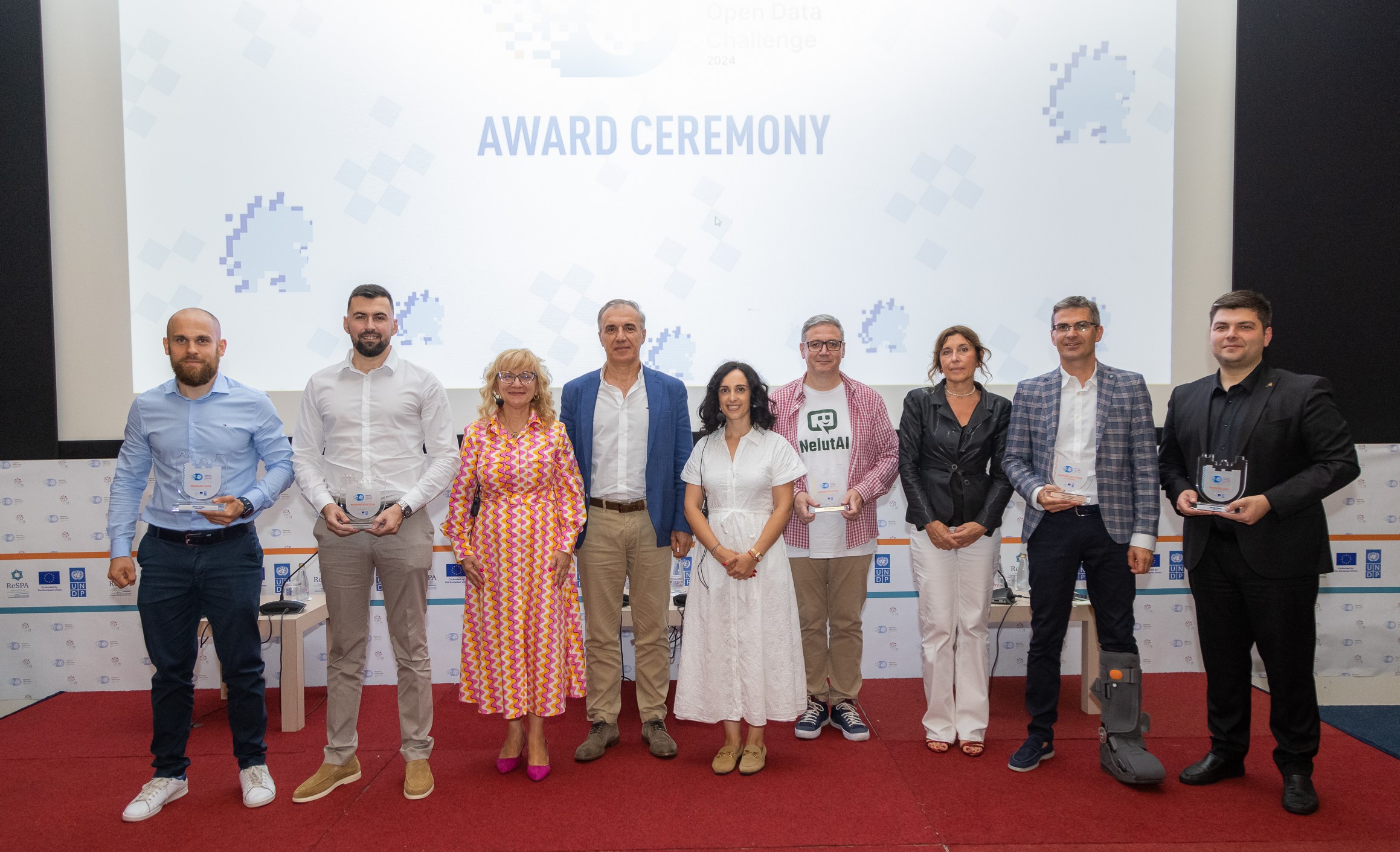Winners of the Regional Open Data Challenge Competition
July 10, 2024

Winners of the Regional Open Data Challenge Competition
Budva, 9 July 2024 – The Regional School of Public Administration (ReSPA) announced the winners of the Regional Open Data Challenge, a competition organised as part of the Seasonal School on Digital Transformation in Budva for participants from Serbia, Montenegro, North Macedonia, Albania, and Bosnia and Herzegovina.
The five teams shared a prize fund of $19,000 and were awarded in four competitive categories: Mobility and Transportation Data, Workforce Mobility, Tourism Atlas, and Demographic Trends.
The winners are Block Build Bor from Serbia (first place, $9,000), Montex Elektronika from Montenegro (second place, $5,000), Jordan Simonov from North Macedonia (third place, $3,000), and Enrriko Kapiti from Albania and Citrus Codes from Montenegro in the category of “Idea”, where each winner was awarded a prize of $1,000.
On behalf of the United Nations Development Programme (UNDP), Sanja Arizanović, project manager for the Digital Innovation team presented the prizes.
“We wanted to inspire open data users and public administrations in the region and highlight the use value of open data and the opportunities created by quality data. We are pleased with the winning solutions, and we hope to see more quality open data available in the future to allow all citizens of the region to benefit from similar solutions,” Arizanović said.
According to the rules of the competition, applicants could submit their innovative ideas in the “Solution” category and be the ones to work towards the solution to compete for a bigger prize. Meanwhile, in the “Idea” category, the competition invited applicants – teams or individuals with no resources to develop a solution – to submit only their ideas where open data can be used for the benefit of the community. Out of five winning ideas, three applicants will transform their ideas into open data-based solutions for the common good - Block Build Bor, Montex Elektronika and Jordan Simonov.
The "Block Build Bor" aims to develop an AI bot to provide tourists with personalised information and assistance via platforms such as WhatsApp, Viber, Telegram, and Facebook Messenger.
“Our bot will use open data to provide real-time information about local attractions, accommodations, and events. That way, we will enhance the transparency and accessibility of information, enabling tourists to make informed decisions, offering personalised recommendations, and encouraging community engagement through content and insights sharing,” said Miodrag Strak from the team Block Build Bor.
Montex Elektronika will create a travel planning platform, “Montenegro Tourism Atlas”, that will provide data for digital nomads, thereby promoting digital transformation and economic development in Montenegro. The platform will offer detailed information about cultural landmarks, nature attractions, transportation, and events, as well as general information about public services, employment, local resources, and legal issues, facilitating the stay and work of tourists and digital nomads. Also, the platform aims to support the 2025 Digital Nomad Attraction program coordinated by the Ministry of Public Administration of Montenegro.
“Our goal is to inspire our colleagues in the public sector to provide access to open data we need, through our platform and examples of good practice on the global scale, to promote our country in the best possible manner,” said Vladimir Jokić, project manager for the Montex Elektronika team.
The project submitted by Jordan Simonov and Bojan Šimbov proposes to address migration challenges in the Western Balkans, with the idea to develop a platform that will automatically analyse and display migration data for the countries in the region, with a special focus on North Macedonia.
“This project responds to the growing trend of international migrations and associated challenges such as brain drain and structural issues hindering the region's development. The project will enable evidence-based decision-making and create opportunities for future use and benefit of all social actors,” said Bojan Šimbov.
In the “Idea” category, Enrriko Kapiti and Franc Rusha from Albania proposed a solution to reduce traffic noise in Shkodra, northern Albania, using sensors that could detect level of noise and screens that alert citizens and drivers in real-time when noise exceeds permissible limits.
Meanwhile, Citrus Codes from Montenegro proposed using open data on unemployment rates, job seeker profiles, and average salaries to help new investors find the best locations to start a company.
Regional Open Data Challenge was conducted by ReSPA and the United Nations Development Programme in Serbia (UNDP). The competition was open to participants from ReSPA member countries – Serbia, Montenegro, North Macedonia, Albania and Bosnia and Herzegovina – with the aim to promote innovative reuse of open data to enhance transparency, accountability, inclusiveness, and efficiency in service design and delivery.


 Locations
Locations